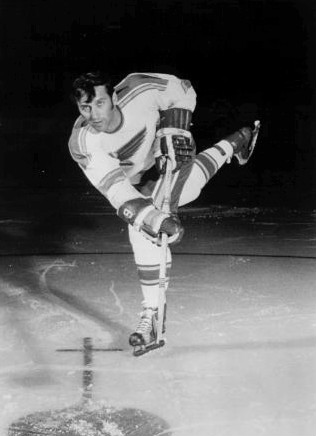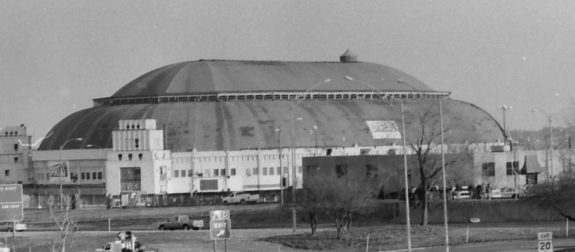There are lots of words one could use to describe the St. Louis Blues fans. A couple that come to mind are ‘faithful’ and ‘dedicated’. For Frank St. Marseille, I think both adjectives can also be used to describe the former Blue. While the Blues had to wait a long time to get back to the Stanley Cup Final, St. Marseille had to wait a long time just to get his chance to even play in the NHL.
Related: 5 Best NHL Backups
The odds were stacked against St. Marseille from the beginning. He didn’t start skating until he was 10 years old, he didn’t play organized hockey until he was 13 and he didn’t start playing junior hockey until the age of 21. For many kids in Canada, skating comes as soon as they learn to walk.

Following his second and last year with the Levack Huskies of the Northern Ontario Hockey Association, he finally attempted to move up to juniors but, again it took time. To start with, he didn’t get drafted. After a few attempts, he finally made it. It wasn’t until his third try, that he finally signed on with the Chatham Maroons of the International Hockey League.
Stuck in the International Hockey League
Here again, it took a while to move up. He played this first two years of junior hockey with the Chatham Maroons before moving on to play the next three years with the Port Huron Flags in the International Hockey League. It was towards the end of his time with Chatham that his junior hockey career really began to take off. While he was there, he helped lead the team to the Turner Cup championship of the IHL in 1966, and, by 1967, he was a second-team All-Star in the International Hockey League.
Following his 31-goal season in his second year at Chatham, St. Marseille’s play began to become very consistent as he then scored 38, 45 and 41 goals respectively, in each of his three seasons with the Port Huron Flags. St. Marseille was beginning to shine on the ice but even with all of the accolades, it was an odd turn of events that eventually led to him signing with the Blues.

It turns out that during this time his brother Frederick, who was pursuing a music career in Los Angeles, wrote a letter to a gentleman named Lynn Patrick. Patrick at that time was the coach and general manager of the Los Angeles Blades in the WHL and interestingly enough, later became the GM of the NHL expansion team Blues.
Whatever Frederick said, it apparently helped get Patrick to put Frank on the Blues roster prior to the start of their 1967-68 inaugural season, though it wouldn’t be until a little later that year when he eventually got his chance to prove he truly belonged in the NHL.
Final destination, the St. Louis Blues and the NHL
After signing with the Blues before the 1967-68 season and just nine games with their minor league team the Kansas City Blues of the CHL, St. Marseille was finally called up to NHL at the age of 27. In fact, not only was he called up but so were his linemates Terry Crisp and Gary Sabourin. Coach Scotty Bowman was quoted at the time as saying the trio “were better than our third line in St. Louis.”
All told, St. Marseille played five and half seasons with the Blues. While his play may not have been spectacular, it continued to be what it always was through most of his career – steady and consistent. His goal production with the Blues was lower than when he was in juniors, but by his third season with the team, his point totals were always in the 50s.
He had a career year during the 1969-70 season for the Blues with 16 goals and 43 assists, 59 points in all. He was also a member of the All-Star team for the West Division in 1970 and it was from that year until 1972 that he was team captain as well. In addition to that, he got to play in the Stanley Cup Final in his first three years with the Blues. He never made it there again.
Related: The NHL’s Top 50 Russians of All-Time
By 1977, St. Marseille’s playing days in the NHL were over. He later moved back to Canada in order to see both his sons and grandsons play hockey. He was also inducted into the Valley East Hall of Fame in Ontario, Canada in 1998. For a kid from the small mining town of Levack, Ontario, who got what many would consider a late start in hockey, I think it’s safe to say that he didn’t do too bad. As for the Blues, I think they were lucky to have him.